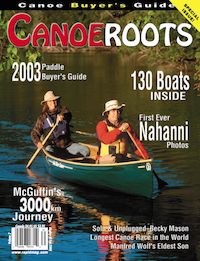In the last stretch of the Yukon River Quest, a 742-kilometre paddling race from Whitehorse to Dawson City, many competitors fall asleep between strokes while others hallucinate. Exhausted competitors have recounted such visions as a dangerous waterfall in their path, a canoe with musicians dressed in tuxedos and even a boat full of laughing chipmunks.
The Yukon River Quest is a gruelling event that has drawn paddlers from around the world since 1999—elite marathon pad- dlers, former Olympians and physically honed triathletes as well as novices seeking the adventure of their lives.
There are categories for kayaks and crew boats, but the tandem marathon canoes have always been the first finishers, with the record being just over 52 hours, includ- ing the eight hours of mandatory rest.
An unprecedented 36 boats entered in 2002. One of the most inspirational teams consisted of two 18-year-old Whitehorse ath- letes, Erin Neufeld and Stephen Horton. Embodying the spirit of the race, they entered with the goals of finishing in a respectable time of 70 hours and remaining friends through the ordeal.
Similar to the elite paddlers, Erin and Stephen used a lightweight 49-pound Jensen-design Kevlar canoe and graphite bent-shaft paddles.They kept the boat light by carefully calculating even how much water to carry between stops.
Competitive teams rarely go on shore and many serious racers include “potty training” along with their daily workouts.“During the race, we use a potty and avoid the time that would be lost if we had to go on shore,” Bob Vincent, the top finisher in 2002 explained. “When I coach marathon canoeists, I put a potty under the canoe seat and replace the canoe seat with a toilet seat.”
Erin and Stephen decided against the potty, but did prepare by paddling two to six hours each day as soon as the ice broke and doing one 20-hour non-stop paddle.
Erin spent much of her youth paddling Yukon rivers with her father. She quickly learned to keep up a pace of 60 strokes per minute, approaching the 85-stroke-per-minute rate of top marathoners. Stephen is a member of Yukon’s cross-country ski team.
At noon on Thursday, June 27, Erin and Stephen joined the field of 80 competitors waiting at the start to begin the short sprint from Main Street to their boats on the Yukon riverbank. Ahead was Lake Laberge, the only lake in the course. This 48-kilometre stretch of open water is infamous for its sudden winds and metre-high waves. This year the lake remained calm and by 10 p.m. Erin and Stephen entered the fast current of the “Thirty Mile” section of the Yukon River.
They relaxed and ate their favourite snack—papaya and melon. Food is difficult to digest during a race so the choice is criti- cal. Racers take dextrose, energy gels, drinks and bars—one elite marathoner eats tapioca.
They paddled through the dusky night of subarctic summer, taking turns for a few minutes sleep until the sun beamed down on the river once again.
After 25 hours of paddling, the sleepy pair pulled into the first checkpoint at the small central-Yukon town of Carmacks under a hot noonday sun.They ate lasagna and slept most of the mandatory two hours.
Several hours later and near the end of day two, Erin and Stephen paddled into the second sanctioned stop at Minto for a mandatory six-hour break. They were again met by their families who had warm food and tents ready. All Erin and Stephen had to do was eat and crawl into their sleeping bags.
Now more than halfway through the race, they were in ninth place. The last 325 kilometres has no road access and includes a section of the river where a maze of channels confuses tired paddlers. In 2001, a kayaker took a back channel, became disori- ented and began paddling upstream. He pulled onto an island and was finally rescued after a 14-hour search.
When Erin and Stephen entered this section, the sun dipped briefly below the horizon, marking the second night of the race. This is where Erin’s experience on the Yukon River paid off as she was able to find the correct route despite the fading light.
In the second half of the race they decided to keep paddling until they absolutely had to rest. When Stephen took his break, Erin tried to keep canoeing while he slept, but she soon dozed off too. They drifted for 45 minutes until they woke with a start and picked up the pace, feeling rejuvenated and laughing over their narcolepsy.
As they paddled the final stretch into Dawson City, the rising sun flooded the river valley. First-time racers often quit at the checkpoints or arrive in Dawson City looking like refugees from a war zone. Erin and Stephen arrived in Dawson smiling and healthy after 69 hours on the river. In the last leg they had paddled almost non-stop for 26 hours.
They made their goal of 70 hours and finished ninth out of 21 canoe teams. If they had pushed a bit harder they could have won some of the $15,000 prize money. But Erin and Stephen paced themselves, took the time to enjoy each other’s company and made this a memorable adventure under the midnight sun.
Yvonne Harris writes children’s fiction and lives in Whitehorse, Yukon. She has raced in all four River Quest races, placing fifth overall in 2000. The 2003 Yukon River Quest is planned for Wednesday, June 25.



